Related Research Articles

A Masonic lodge, often termed a private lodge or constituent lodge, is the basic organisational unit of Freemasonry. It is also commonly used as a term for a building in which such a unit meets. Every new lodge must be warranted or chartered by a Grand Lodge, but is subject to its direction only in enforcing the published constitution of the jurisdiction. By exception the three surviving lodges that formed the world's first known grand lodge in London have the unique privilege to operate as time immemorial, i.e., without such warrant; only one other lodge operates without a warrant – the Grand Stewards' Lodge in London, although it is not also entitled to the "time immemorial" title. A Freemason is generally entitled to visit any lodge in any jurisdiction in amity with his own. In some jurisdictions this privilege is restricted to Master Masons. He is first usually required to check, and certify, the regularity of the relationship of the Lodge – and be able to satisfy that Lodge of his regularity of membership. Freemasons gather together as a Lodge to work the three basic Degrees of Entered Apprentice, Fellowcraft, and Master Mason.
The history of Freemasonry encompasses the origins, evolution and defining events of the fraternal organisation known as Freemasonry. It covers three phases. Firstly, the emergence of organised lodges of operative masons during the Middle Ages, then the admission of lay members as "accepted" or "speculative" masons, and finally the evolution of purely speculative lodges, and the emergence of Grand Lodges to govern them. The watershed in this process is generally taken to be the formation of the first Grand Lodge in London in 1717. The two difficulties facing historians are the paucity of written material, even down to the 19th century, and the misinformation generated by masons and non-masons alike from the earliest years.
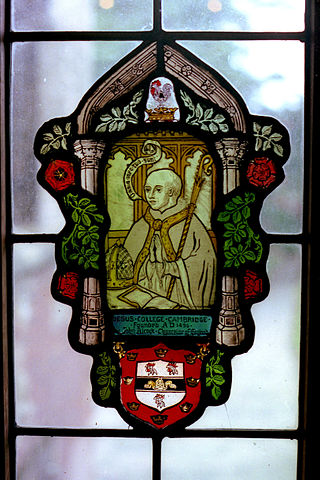
John Alcock was an English churchman, bishop and Lord Chancellor.
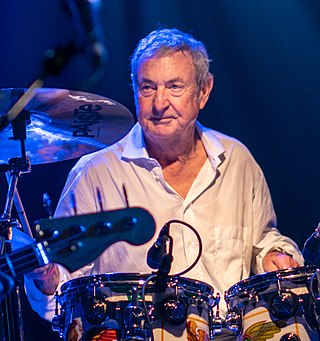
Nicholas Berkeley Mason is an English drummer and a founder member of the progressive rock band Pink Floyd. He has been the only constant member since the band's formation in 1964, and the only member to appear on every Pink Floyd album. He co-wrote Pink Floyd compositions including "Echoes", "Time", "Careful with That Axe, Eugene" and "One of These Days".
Henry Yevele (c. 1320 – 1400) was an English mason. He was considered to be the most prolific and successful master mason active in late medieval England. The first document relating to him is dated 3 December 1353, when he purchased the freedom of London. In February 1356 he was sufficiently well known as a mason that he was chosen as one of a commission of six cutting masons who were to inform the mayor and aldermen about the acts and articles of the craft.
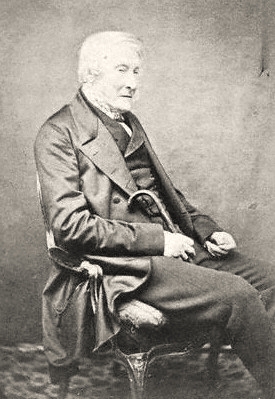
George Percy, 5th Duke of Northumberland PC, styled Lord Lovaine between 1790 and 1830 and known as the Earl of Beverley between 1830 and 1865, was a British Tory politician. He served as Captain of the Yeomen of the Guard under Sir Robert Peel between 1842 and 1846. He succeeded to his peerage on 12 February 1865, after the death of his childless cousin Algernon Percy.
Beverley Randolph was an American politician from Virginia. From 1788 to 1791, he served as the eighth Governor of Virginia.
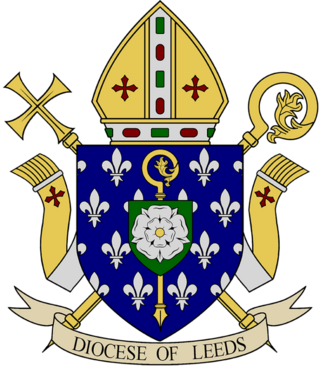
The Diocese of Leeds is a Latin Church diocese of the Catholic Church centred on Leeds Cathedral in the city of Leeds in West Yorkshire, England. It was founded on 20 December 1878, with the splitting of the Diocese of Beverley, which had covered all of Yorkshire. The Diocese of Leeds was made to cover the historic West Riding of Yorkshire, while the Diocese of Middlesbrough took over the diocesan organisation of the rest of Yorkshire.

The organisation now known as the Premier Grand Lodge of England was founded on 24 June 1717 as the Grand Lodge of London and Westminster. Originally concerned with the practice of Freemasonry in London and Westminster, it soon became known as the Grand Lodge of England. Because it was the first Masonic Grand Lodge to be created, modern convention now calls it the Premier Grand Lodge of England in order to distinguish it from the Most Ancient and Honourable Society of Free and Accepted Masons according to the Old Constitutions, usually referred to as the Ancient Grand Lodge of England, and the Grand Lodge of All England Meeting at York. It existed until 1813, when it united with the Ancient Grand Lodge of England to create the United Grand Lodge of England.
Robert Vertue was an English architect and master mason.
The decade of the 1280s in art involved some significant events.

24 Heures de la vie d'une femme is a 2002 film by Laurent Bouhnik, based on the 1927 novel 24 Stunden aus dem Leben einer Frau by Stefan Zweig. The music is by Michael Nyman, and the accompanying soundtrack album is his 45th.
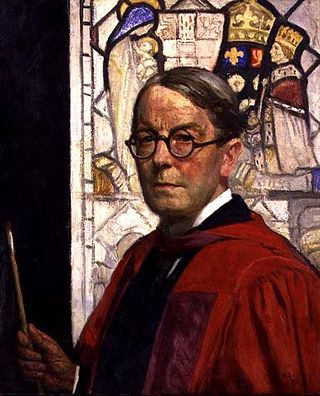
Robert Anning Bell was an English artist and designer.
Okeley Manor was an early 19th-century plantation in Fairfax County, Virginia, United States. Okeley, the residence of prominent Alexandria physician Richard Chichester Mason (1793–1869), was one of the principal Mason family estates in Northern Virginia. Mason's plantation house was used as a hospital during the American Civil War and burned to prevent the spread of smallpox.
Beverley Randolph Mason was an American military officer and educator who was the founder and principal of the Gunston Hall School for young women in Washington, D.C. Mason was a great-grandson of George Mason, author of the Virginia Bill of Rights.

Nathaniel Hitch (1845–1938) was a British sculptor. As a young man, he became an apprentice sculptor journeyman and after studying at the Borough Polytechnic and experience working alongside architectural sculptors, he developed a career carving altarpieces, church furniture and other decorative features for churches.

The Statute of Westminster of 1285, also known as the Statute of Westminster II or the Statute of Westminster the Second, like the Statute of Westminster 1275, is a code in itself, and contains the famous clause De donis conditionalibus, one of the fundamental institutes of the medieval land law of England.
Robert Beverley may refer to:

The Paviours Arms was a public house in Neville House, Page Street, City of Westminster, that was said to be London's most complete Art Deco pub.
References
- Binski, Paul (1990) The Cosmati at Westminster and the English Court Style. The Art Bulletin 72(1):6-34.
- Christopher Wilson (2004), ‘Beverley, Robert of (d. 1285)’, Oxford Dictionary of National Biography.